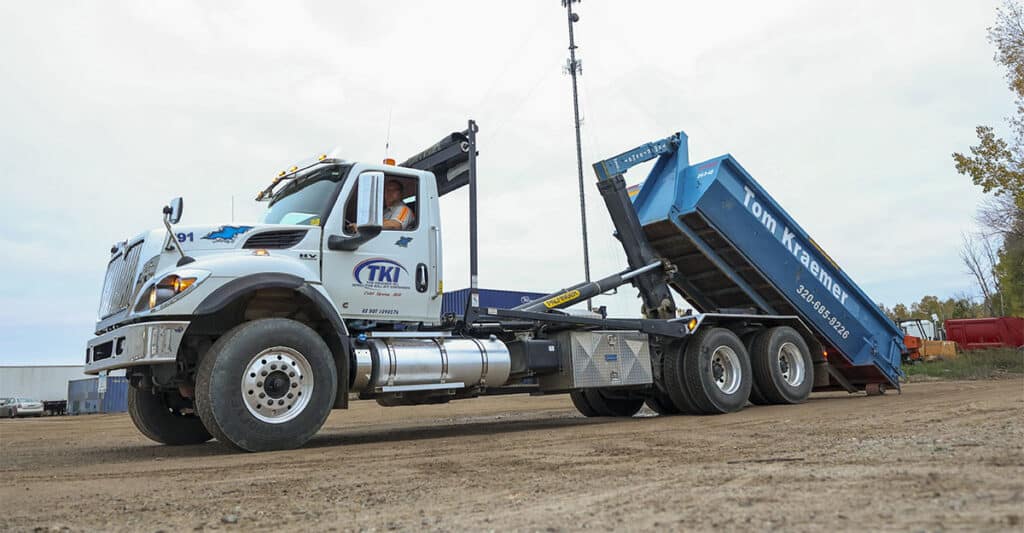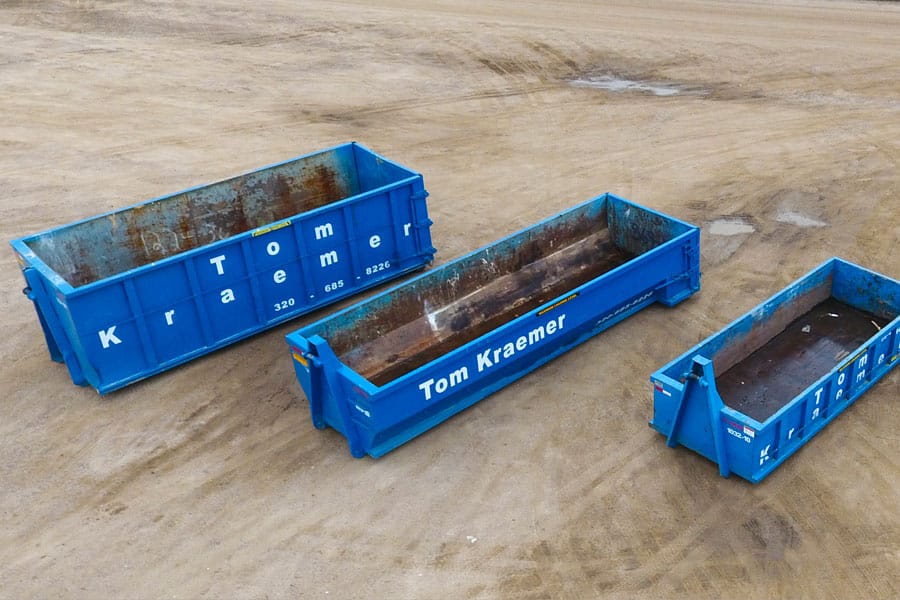Selecting the right dumpster for your construction project is essential to staying on schedule and avoiding extra costs. For many contractors, the challenge lies in knowing exactly what size, type, and rental terms will fit the job without overpaying or running into logistical headaches. At Tom Kraemer Inc., we make this process straightforward so you can focus on the work that matters most.
In this guide, you will learn how to choose the right size, account for debris type, plan for site placement, match your rental period to your timeline, and navigate local regulations. By the end, you will be ready to confidently select the roll-off construction dumpster that works best for your project.
What Size Roll-Off Construction Dumpster Do You Need?
Roll-off construction dumpsters come in standard sizes: 10, 20, and 30 yards, which can handle everything from small renovations to large-scale builds. Across Minnesota, including St. Cloud, Alexandria, Annandale, Carlton, and surrounding communities, these sizes cover a wide variety of commercial and residential construction needs.
- 10-yard: Great for small cleanouts, light demolition, new builds, or minor remodeling work.
- 20-yard: Ideal for medium projects such as roofing jobs, siding replacement, or multi-room renovations.
- 30-yard: Works well for larger remodels and substantial debris removal.
When in doubt, it is often smart to size up. Overloading a dumpster can lead to extra fees or require an additional container. You can explore detailed options on our roll-off dumpster services page.
How Does Debris Type Affect Your Choice?
The materials you plan to dispose of play a big role in determining the right dumpster size and type. Heavy debris like concrete, asphalt, or dirt may require a smaller container to meet weight limits, while lighter materials like wood, drywall, or insulation can often go into larger containers.
Exceeding weight limits can increase your costs, so it is important to plan accordingly. Additionally, some materials require special handling or are prohibited altogether. For a full breakdown of weight limits, placement tips, and prohibited items, download our Dumpster Guidelines.
What Site Logistics Should You Plan For?
Before delivery, evaluate your site for accessibility and placement space. Measure the area where the dumpster will go and ensure there is enough clearance for the delivery truck to safely maneuver.
Urban job sites might require smaller containers or street placement permits, while open commercial lots offer more flexibility. Preparing your site in advance helps prevent delays during delivery or pickup.

How Long Will You Need the Dumpster?
Your rental length should align with your project’s schedule. Booking too short may cause last-minute extensions, while overbooking could mean paying for unused time.
TKI offers flexible rental terms to fit your needs; whether that’s a few days, several weeks, or longer. Planning ahead ensures smooth waste management from start to finish.
Why Local Regulations and Permits Matter
Different municipalities across Minnesota have specific rules regarding dumpster placement, required permits, and accepted materials at disposal facilities. For example, some cities restrict how close a dumpster can be to a sidewalk, while others require permits for street placement.
Knowing these regulations in advance helps you avoid fines or project delays. Our team can guide you through local requirements so you stay compliant.
How to Confidently Choose the Right Dumpster
Choosing the right roll-off construction dumpster comes down to five main considerations: size, debris type, site logistics, rental duration, and local regulations. When you understand these factors, you can make decisions that keep your project efficient and cost-effective.
At Tom Kraemer Inc., we work with contractors and homeowners across Minnesota to match them with the right dumpster for the job. Our industry expertise, flexible rental options, and local knowledge ensure your waste management plan supports your project goals.
Request a customized quote for your roll-off construction dumpster today and keep your next project on track.
Frequently Asked Questions
What size roll-off construction dumpster is best for large commercial projects?
A 30-yard dumpster is typically best, but it ultimately depends on the type and volume of debris.
Can I mix different types of construction debris in one dumpster?
Often yes, but some materials must be separated due to weight or local disposal regulations. Check with your provider first.
How far in advance should I schedule a roll-off construction dumpster rental?
Book at least a few days in advance, and earlier during peak construction seasons, to ensure availability.

